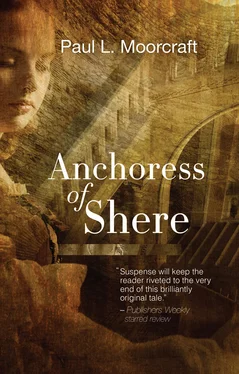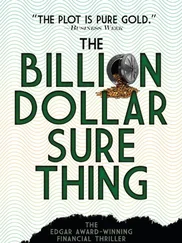Paul Moorcraft - The Anchoress of Shere
Здесь есть возможность читать онлайн «Paul Moorcraft - The Anchoress of Shere» весь текст электронной книги совершенно бесплатно (целиком полную версию без сокращений). В некоторых случаях можно слушать аудио, скачать через торрент в формате fb2 и присутствует краткое содержание. Жанр: Триллер, на английском языке. Описание произведения, (предисловие) а так же отзывы посетителей доступны на портале библиотеки ЛибКат.
- Название:The Anchoress of Shere
- Автор:
- Жанр:
- Год:неизвестен
- ISBN:нет данных
- Рейтинг книги:4 / 5. Голосов: 1
-
Избранное:Добавить в избранное
- Отзывы:
-
Ваша оценка:
- 80
- 1
- 2
- 3
- 4
- 5
The Anchoress of Shere: краткое содержание, описание и аннотация
Предлагаем к чтению аннотацию, описание, краткое содержание или предисловие (зависит от того, что написал сам автор книги «The Anchoress of Shere»). Если вы не нашли необходимую информацию о книге — напишите в комментариях, мы постараемся отыскать её.
The Anchoress of Shere — читать онлайн бесплатно полную книгу (весь текст) целиком
Ниже представлен текст книги, разбитый по страницам. Система сохранения места последней прочитанной страницы, позволяет с удобством читать онлайн бесплатно книгу «The Anchoress of Shere», без необходимости каждый раз заново искать на чём Вы остановились. Поставьте закладку, и сможете в любой момент перейти на страницу, на которой закончили чтение.
Интервал:
Закладка:
And the sounds were magnified: the visitor could hear insects hopping in the nave, and the birds sang so loudly outside the church that every syllable echoed in his brain. Every sound was comprehensible, too: the birds were arguing about food, the locations of their nests, and even warning of the stranger who had just walked into the church.
The visitor floated through a bewitching landscape of sound and colour, warmth and peace and light; the whole world was in harmony with his movements. The tall stranger moved towards the cell and passed through the stones and sat on the bench. The woman was not startled by his presence.
She spoke calmly: “Where are you from, dressed in that strange garb?”
“I am from a different place and time,” he replied gently.
“From Heaven?” Christine asked.
“Neither Heaven nor Hell.”
“From purgatory, then?” she asked sweetly.
“From six hundred years in the future, from the twentieth century, a place which might appear like Hell to you, sweet Christine.”
She did not ask how he knew her name, but knelt and kissed Father Duval’s hand.
The priest stopped typing, and read the words on the white page. He smiled and thought, “My vision, my pure vision of Christine, but not for others to read. Sweet indulgence, but not my history.”
He looked at his crucifix, and acknowledged the need for penance. The penance for pride: first to kneel and kiss the ground, then to stare at dead men’s-or in this case, dead women’s-bones to remind the sinner of the transience of mortal life. He made his way into the cellar to visit Denise. Yes, she had been proud, and defiant, too. She had fought back, and rammed a full container of paraffin against his hand. He lost a part of his finger-caught in a car door, he had told the doctor in casualty. That was his penance then. But he had made her suffer for the injury to his hand, and for hiding notes, portions of a diary. Yes, he had thought Denise was coming to believe in him, but she had been lying all along. She had hated him, even boasted of injuring him, she had not wanted to learn, and his patience had reached its final limit. He looked upon her skeleton and wondered where her soul had gone.
He returned to his study, ready to continue with his project, to complete the life of Christine Carpenter. The effects of the potion had almost worn off and he could become a serious writer again.
March 1334
Despite Father Peter’s protestations, Christine embarked upon a rigorous course of self-denial for the sin of abandoning her calling. Besides four extra hours of prayer on her knees every day, she requested herbs to purge her stomach, bloated after months of decadent living, although in truth she was still too thin. And she asked to be leeched-Father Peter prevented this. The anchoress took to scourging herself, and wearing the hair shirt which was reluctantly granted to her, while all the time she prayed for proof positive of a stigmata. When, after months of prayer and self-denial, it did not come, she begged to be branded on the cheek with a hot iron in the shape of the Cross. Father Peter grew angry, and worried, because he feared that her devotion was turning into mania.
William tried to dissuade her from extreme devotions: “The body cannot suffer the demands of thy spirit. Please eat and rest and do not scourge thyself.”
She said, almost petulantly, “My punishments are naught compared with those inflicted on our Saviour.”
“Aye, child, but you must not presume to be too much like Christ.”
“No, father, I wish to be near Christ in every way.”
William could not overcome his daughter’s stubborn resolve, but to his great concern and anger there was one who could reach out to her: Mistress Anna de Kempis. Her fantastic passions were now welcomed by the anchoress of Shere. Anna secretly brought her purgatives and the hedgehog belt which Father Peter had refused.
Writing this section excited Duval. Some of these ideas, he thought, could be adapted for Marda: perhaps, for example, some cuts on her palms, a stigmata as it were. The vision of her blood dripping slowly into his mouth made him shudder. Branding on the cheek, suggested by the garrulous American, was a new concept to Duval, but one worth considering. He would thank the professor next time he saw him. Yes, he was sorry that he had been so curt with the man the last time they had spoken.
Eight miles away, Professor Irvine Gould was reading The Times while waiting outside Bishop Templeton’s office. The bishop’s assistant made him a cup of tea.
“So sorry to keep you waiting, professor,” he said. “The bishop’s meeting is running late. He’ll be with you in a few minutes, I’m sure.”
A few minutes later the bishop did arrive. “Terribly sorry, Professor.” Gould still marvelled at how often the Brits said “sorry.” “Held up in a meeting…Ah, good, you have some tea. Do bring it with you…”
The American was led into a sumptuous book-lined study with a large and expensive free-standing globe set in a mahogany frame. It was more like the study of the president of an Ivy League university, too spoiled by oil-rich alumni, a little too decadent for the workplace of a man of the cloth. Gould thought that it might have suited the Vatican, but in Guildford it looked out of place.
“Please sit down, Professor.” The bishop talked with practised bonhomie. “I was so pleased to receive your letter. Glad to meet someone who is a fellow student of church architecture. I must apologise-I haven’t read your paper in its entirety, the one you very kindly sent me-on late Gothic experiments in-what was it again?”
“Cathedrals in southern England, Bishop.”
“Ah, yes, but I will read it as soon as I can. Now, what can I do for you?”
The professor explained that he wanted access to certain medieval church records that dealt with monastic orders in Guildford.
“Yes, yes, no problem there.” The professor noticed the cleric’s nasal delivery. “If we have what you want you can look through them. I’ll get in touch with our archivist as soon as we finish our chat.” A short chat was implied. “By the way, what do you think of Gibberd’s design?”
The bishop was clearly in no mood for extended small talk, but the professor responded to his comments on the new Catholic cathedral recently consecrated in Liverpool: “If I may say so, Bishop, it looks like a UFO.”
“Precisely my view. Although I think we should be a little adventurous from time to time, I’m afraid I do prefer classical form. Mind you, I hope I am progressive in matters of theology.”
The American felt he could proceed: “I worry about new church architecture. Churches aren’t looking like churches any more. Some resemble gyms; others are like spaceships or hangars or theatres in the round. I worry this might be a portent of a kind of cultural collapse. It’s important to recognise that in matters of religion, especially Catholicism, based as they are on faith and obedience, form really is substance. Life will imitate art, if you like. What a thing appears to be, it is. It doesn’t look like a church, therefore it isn’t a church, therefore we don’t go there to worship God.”
“Are you suggesting, Professor, that there is a direct correlation between ecclesiastical modernism and religious dysfunction?”
“I sure am, Bishop. Apses and chancels and vestries, the norm for fifteen hundred years, are succumbing to bizarre notions of modernity and so-called relevance. Even existing churches are being deformed-when they’re not turned into markets or theatres or bingo halls. Cathedrals are ransacked by modern-day architectural barbarians. Pulpits and altars are smashed. It’s as though Cromwell’s thugs are doing a grand tour of Britain, and America is worse.”
Читать дальшеИнтервал:
Закладка:
Похожие книги на «The Anchoress of Shere»
Представляем Вашему вниманию похожие книги на «The Anchoress of Shere» списком для выбора. Мы отобрали схожую по названию и смыслу литературу в надежде предоставить читателям больше вариантов отыскать новые, интересные, ещё непрочитанные произведения.
Обсуждение, отзывы о книге «The Anchoress of Shere» и просто собственные мнения читателей. Оставьте ваши комментарии, напишите, что Вы думаете о произведении, его смысле или главных героях. Укажите что конкретно понравилось, а что нет, и почему Вы так считаете.












